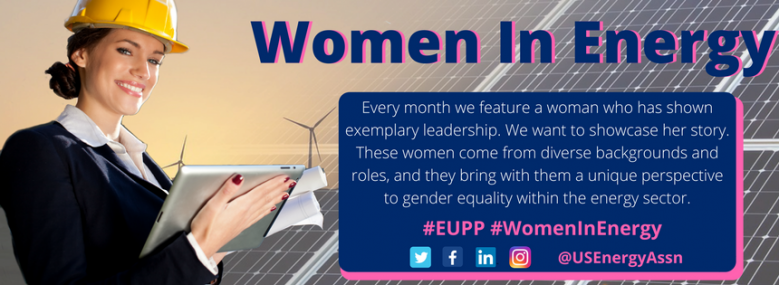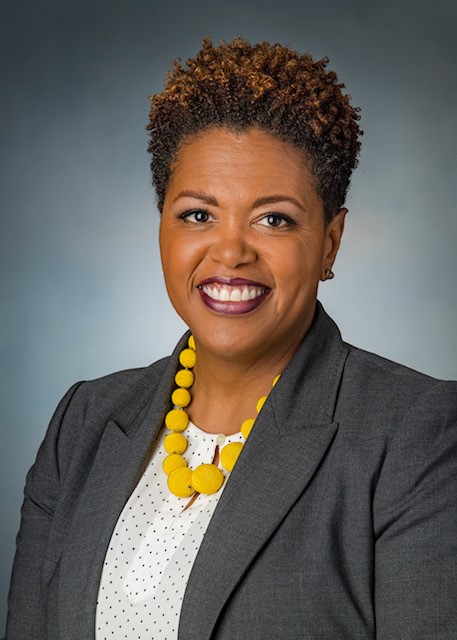
Women In Energy: Bentina C. Terry
The Women in Energy series is a joint project between USEA and USAID that was developed out of USEA’s Engendering Utilities Partnership, a program funded by USAID to improve gender policies and gender outcomes at their respective organizations.

Every month we feature a woman who has shown exemplary leadership and showcase her story. The women among you come from diverse backgrounds and roles and bring a unique perspective to gender equality within the energy sector.
Bentina C. Terry is Senior Vice President for Northwest Region for Georgia Power. In this role, Bentina is responsible for the company's operations, sales, customer service, economic and community development, and external affairs activities for 1.4 million customers across metro Atlanta and the northwest corner of the state.
Bentina is actively involved in the community and feels fortunate to work for a company that has a passion for the communities it serves. She serves on the board of directors for the Midtown Alliance, Posse Foundation, Atlanta Police Foundation, the Atlanta Beltline Partnership, and the Atlanta Women’s Foundation. She is also on the advisory council for the BB&T Open. In 2017, she graduated from Atlanta Regional Commission’s Leadership Institute and has been named one of Atlanta Business League’s 100 Most Influential Women.
Bentina has had a diverse career with Southern Company, beginning in 2001 at Georgia Power. She has worked at Georgia Power, Gulf Power, and Southern Nuclear Operating Company, all Southern Company subsidiaries. In her career, she has been responsible for many different areas of the company including External Affairs, Legislative and Regulatory Affairs, Community and Economic Development, Corporate Communications, Sales and Marketing, Customer Service, Compliance and Ethics, Corporate Services and aspects of Power Delivery. She also served as General Counsel of Southern Nuclear. Bentina began her career practicing law with Troutman Sanders law firm in Atlanta and also served as the Associate General Counsel at Progress Energy in Raleigh, NC prior to coming to Southern Company.
A native of Fayetteville, N.C., Bentina holds a Juris Doctorate degree from the University of Michigan Law School and a Bachelor of Arts in English from North Carolina State University. She is a member of the North Carolina State Bar and the Georgia State Bar, Leadership Atlanta, Leadership North Carolina, Leadership Florida, the International Women’s Forum and Alpha Kappa Alpha Sorority, Inc. She has received various awards and recognitions for her contribution to the state of Florida and northwest Florida including being named one of Influence Magazine’s 100 Most Influential People in Florida Politics (2015), 850 Magazine’s Pinnacle Award (2014), Florida Chamber Foundation’s Chair Award (2014), the Pensacola Chamber of Commerce’s Community Leader of the Year (2013), and one of the Florida Diversity Council’s Most Powerful and Influential Women (2012). She has been selected as a member of the “IN Power List” recognizing the top 100 most powerful and influential people in greater Pensacola area for seven consecutive years (2009-2016) and was named #1 in April 2016. She was also an International Women’s Forum (IWF) Fellow in 2012.
She is married to Antonio Terry and they have one dog, Bubba.
*Neither USEA nor USAID alters the substance of the responses from the women featured. The answers are their own.
Women in Energy Interview Questions
1. How have your education and career path led you to where you are now?
“I wish I could say that it was planned. Early in my career, I was blessed to have mentors and sponsors who invested in me. That coupled with being open to new opportunities and leveraging opportunities that came along during various roles lead me to my current position. I've always valued relationships and seen how being engaged with a diverse network of people can be helpful for my career. To sum it up, it's really been a combination of job performance, understanding the value of relationships and being willing to take a chance in jobs that were different from my education and experiences together that have led me to where I am today.”
2. Over the course of your career, have you witnessed changes in the sector that have launched more women into leadership positions?
“When I first started in the utility sector, I couldn’t name any female CEOs. Now, the names of giants such as Susan Story, who was our first female CEO of a Southern Company operating subsidiary; Kim Greene, current president at Southern Company Gas; and Kathy Hill, who was the first African-American female officer at Georgia Power, are all women on whose shoulders I stand.
In 2019, there are more women in executive leadership roles. But, our industry still hasn’t reached its full potential even though we are seeing more women move into the CEO ranks, I believe that over time we'll continue to see women in increasingly more senior and more diverse roles in the utility sector.
I’m a strong believer that women in our industry need to see women in prominent leadership roles, so they understand anything is possible and that they, too, can aspire to achieve the same. By that same token, I think that men need to see women in executive roles. So, they can start identifying women on their teams who have the potential to lead within the company, so they can fully understand that women can lead and how we lead. But more importantly, women need to be in a diversity of positions because our voices are important, and we need to engage in the conversation.
We need diversity in our ranks regardless of whether it’s gender or sexual orientation or economic status or background. Diversity makes us a better company because outside of these walls the people we serve are diverse. If we live in a silo without diversity, we can't possibly serve our customers to the degree that they deserve.”
3. Technology is transforming the traditional utility business model into a more modern interactive grid. Some utilities view this transformation as an opportunity to focus on change management and diversity. Research provides compelling evidence that inclusion and diversity unlock innovation and drives better business performance. What, if anything, is your organization doing to attract, retain, and promote more women into senior management positions to respond to the dramatic industry transformation?
“Diversity and inclusion are just good business. It’s true, if you want to be more innovative, you need more minds at the table that think differently. We have to challenge the assumptions and beliefs that some people harbor about women that delay their pursuit of a company’s top leadership roles.
That also means, we must be intentional about recruiting women to come into our industry. Once they’re in, we have to provide them with the support networks that they need. It takes men and women supporting and removing the barriers to ensure not only a woman’s success but also the success of any employee.”
4. Are talented women within your organization making it to top leadership positions? Why/why not?
The short answer is yes – could we be doing better? Definitely. We need to get more women in the industry and we need to support them when once inside.
At Georgia Power we have been focused on diversity and inclusion for the last 20 years and we are seeing it in our leadership representation. A key study, recently conducted by Catalyst, shows that women make up 22% of senior management in the utility industry in North America. In comparison, our company numbers were higher than the industry benchmark. We’re proud of these numbers because they are not an accident, they are a result of purposeful efforts on behalf of our company’s leadership.
Again, do we have more work to do? Yes. However, Georgia Power remains focused on ensuring that our talented women employees build strong networks and gain the development experiences necessary to advance.
We are committed as an organization to creating an inclusive environment for all employees. To help create this environment, employees and leaders are required to attend unconscious bias training and all leaders have a Diversity & Inclusion goal in their personal performance plan. In addition, we encourage men to be intentional in expanding their informal mentoring (to women) and creating inclusive environments on their teams.”
5. Companies that embrace diversity outperform their competitors. What type of diversity programs does your organization have in place to mentor future women leaders? How does your organization measure and report gender diversity? Is the data publicly available?
“Georgia Power has several programs that support the development of future women leaders. Intentional Networking, which is geared primarily towards high potential women, is designed for leaders to get-to-know and invest in our talent while providing participants with business and leadership insights and exposure to senior leaders. Another program, LINKS, helps women, minorities, and new hires connect with leaders who help to expand participant’s networks and assist them in navigating the culture as they progress in their careers.
Our Technical Women in Georgia (TWIG) Employee Resource Group hosts workshops and discussions aimed at fostering skills for professional growth. Through MAGIC (Mentoring a Girl in Construction) Camp, TWIG members help develop strong future women leaders and propel young girls’ interest in STEM.
For more experienced leaders, we offer an internal development program that enhances their leadership skills, provides networking opportunities with senior leaders and peers, and builds capacity for developing talent within their organizations.
Georgia Power invests in several external women-focused development programs for all levels of employees up to, and including, executives. One, Signature, supports and fast-tracks women executives through development of key leadership and business skills. We support women leaders in attending various industry-related development programs that provide an opportunity to engage in open dialogue with accomplished women leaders, identify strategies for elevating women in the energy industry and participate in unique networking and learning opportunities.
Several times throughout the year, female officers host senior female leaders in a Student of the Business event that allows for networking and learning about the business.”
6. What actions should the energy and electricity sector be focused on to accelerate change, increase diversity, and foster a better gender balance in the boardroom?
“We must be intentional about attracting women into our sector at a very young age. The sooner we start them on a path to leadership the more likely they are to join companies like Georgia Power. Therefore, the presence of strong women in the boardroom is a necessity if you want a truly diverse company. Women in the board room help to ensure that our company is thinking about the effects of the decisions it makes and the potential impacts on the entire workforce. As a leader in the utility industry, we are responsible for serving all our customers. To carry out that mission, we need to have a board that reflects our customer base.”

